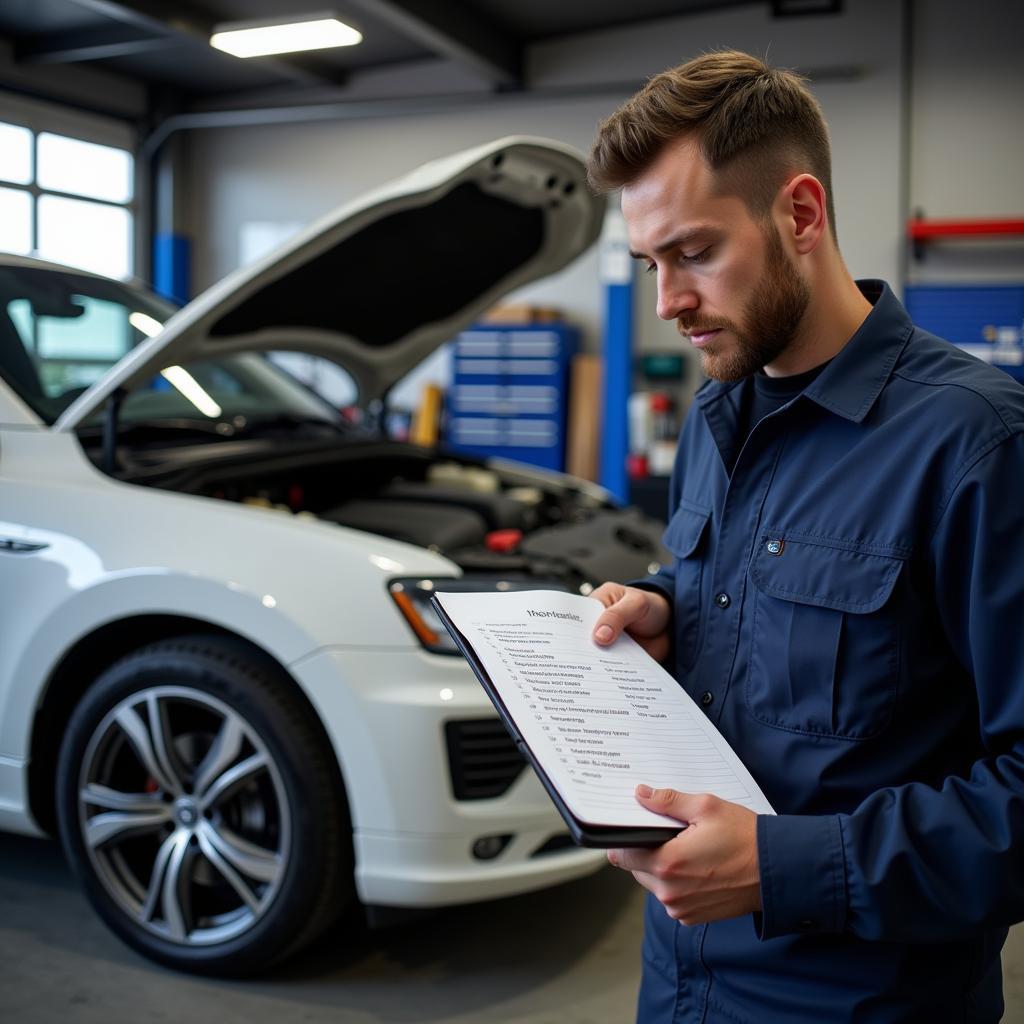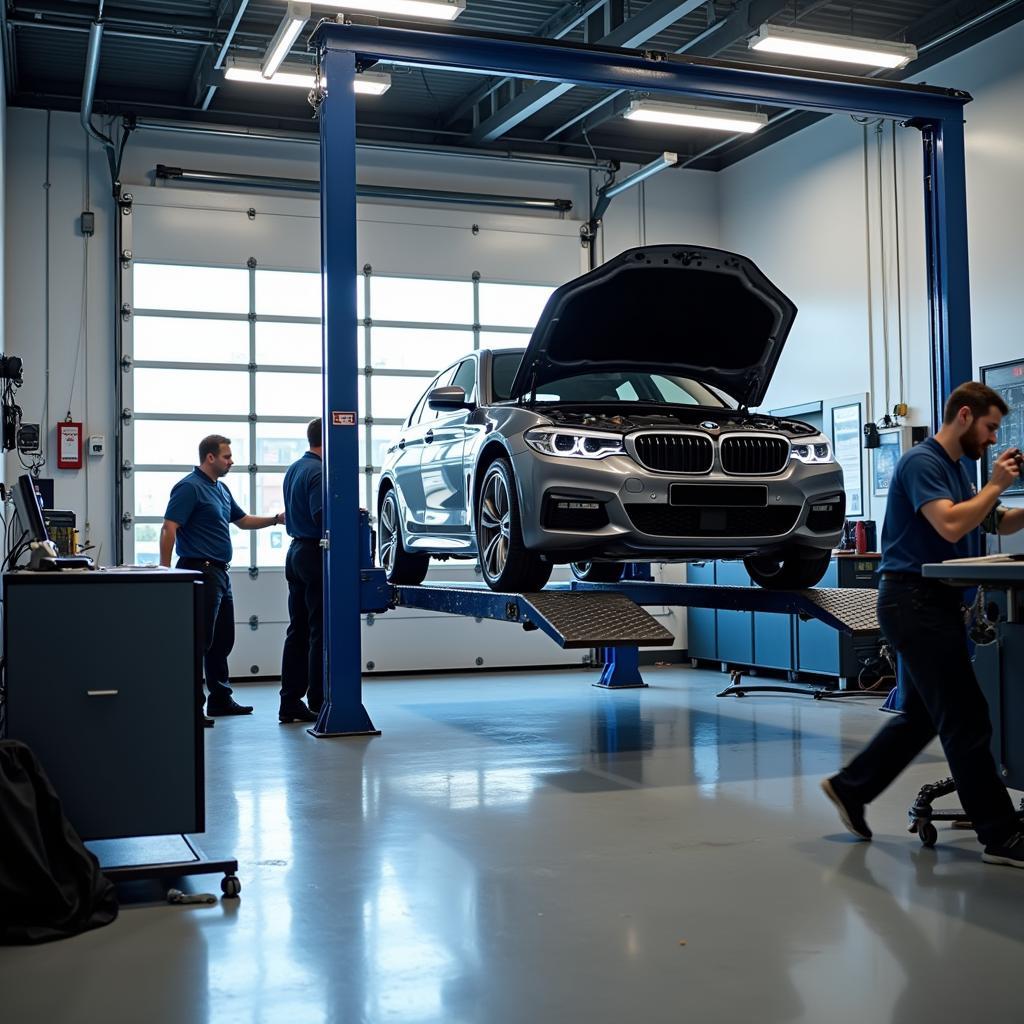The Ultimate Car Service List: What Your Vehicle Needs and When
Knowing what your car needs and when can feel like deciphering a foreign language. Regular car service, however, is crucial for maintaining your vehicle’s health, ensuring safety, and potentially saving you money on costly repairs down the road. This comprehensive guide will break down the essential car service tasks, helping you understand what your car needs and when.
Understanding Your Car’s Needs: The Importance of a Car Service List
Think of your car service list like a health checkup schedule, but for your vehicle. Just like regular doctor’s visits help prevent major health issues, consistent car maintenance prevents small problems from snowballing into major (and expensive) repairs.
 Car Service Checklist
Car Service Checklist
A good car service list considers:
- Your car’s make and model: Different vehicles have different maintenance schedules. Consult your owner’s manual for manufacturer-recommended service intervals.
- Your driving habits: Frequent short trips, stop-and-go traffic, and driving in extreme weather conditions can put extra wear and tear on your vehicle, requiring more frequent service.
- Time and mileage: Most car service tasks are based on either time elapsed or miles driven, whichever comes first.
Essential Car Service Tasks: A Breakdown
While your owner’s manual provides a tailored schedule, here’s a general car service list to give you an idea of the essential tasks:
Regular Maintenance: The Foundation of a Healthy Car
These tasks should be performed regularly, usually every 3,000-5,000 miles or 3-6 months:
- Oil and filter change: The lifeblood of your engine, regular oil changes lubricate moving parts, prevent overheating, and remove contaminants.
- Tire rotation and pressure check: Ensures even tire wear, improving handling and extending tire lifespan. Proper tire pressure also boosts fuel efficiency.
- Fluid top-offs: Check and replenish essential fluids like coolant, brake fluid, power steering fluid, and windshield washer fluid.
- Air filter replacement: A clean air filter ensures optimal airflow to the engine, improving performance and fuel economy.
- Battery inspection: Check battery terminals for corrosion and ensure the battery is holding a proper charge.
Periodic Maintenance: Addressing Wear and Tear
These tasks are typically performed less frequently, based on mileage or time intervals specified in your owner’s manual:
- Brake inspection and service: Includes inspecting brake pads, rotors, calipers, and brake lines. Brake fluid should also be flushed and replaced periodically.
- Spark plug replacement: Worn spark plugs can cause misfires, reducing performance and fuel economy.
- Coolant flush: Removes rust and contaminants from the cooling system, preventing overheating and extending the life of the water pump.
- Transmission service: Involves changing the transmission fluid and filter, ensuring smooth shifting and preventing premature wear.
Visual Inspections: Catching Issues Early On
Never underestimate the power of a visual inspection. Take a few moments to:
- Check your lights: Make sure headlights, taillights, brake lights, and turn signals are functioning correctly.
- Inspect your belts and hoses: Look for cracks, fraying, or looseness.
- Examine your tires: Check for any cuts, bulges, or uneven wear patterns.
- Look for fluid leaks: Pay attention to any puddles or drips under your car.
FAQs: Your Car Service Questions Answered
1. How often do I need a car service?
It depends on your car’s make and model, driving habits, and the type of service. Consult your owner’s manual for manufacturer recommendations.
2. Can I perform some car service tasks myself?
Some tasks, like checking fluids or changing air filters, can be done at home with basic tools. However, more complex tasks are best left to professionals.
3. Why is regular car service important?
Regular car service helps prevent costly repairs, ensures safety, improves fuel efficiency, and extends the life of your vehicle.
4. How do I choose a reputable car service center?
Look for certifications, read online reviews, ask for recommendations, and don’t hesitate to ask questions about their experience and expertise.
5. Can I trust my car dealership for service?
Dealerships employ trained technicians familiar with your car’s make and model. However, they can be more expensive than independent mechanics.
Beyond the Basics: Additional Car Service Considerations
Beyond the essentials, consider these additional car service tasks:
- Wheel alignment: Ensures your wheels are pointing in the correct direction, improving handling and tire wear.
- Timing belt/chain replacement: A crucial maintenance task that prevents catastrophic engine damage.
- Fuel system cleaning: Removes deposits from the fuel injectors, fuel lines, and tank, improving performance and fuel economy.
 Modern Car Service Center
Modern Car Service Center
Car Service: An Investment, Not an Expense
Taking care of your car through regular service is an investment that pays off in the long run. A well-maintained vehicle is safer, more reliable, and holds its value better over time. By understanding your car’s needs and following a consistent car service list, you can enjoy worry-free driving for years to come.
Need Car Service Support?
For 24/7 assistance, contact us via WhatsApp: +1(641)206-8880 or Email: [email protected]. Our dedicated team is ready to answer your questions and provide expert car service support. You can also find helpful resources and information on our website, including articles on car service Lansing Michigan, car service interim, and car service Daventry. Additionally, be sure to check out our car service checklist template for a printable guide to keep track of your vehicle’s maintenance. We also offer valuable insights into car service City Constantia, providing you with local expertise and service options.

